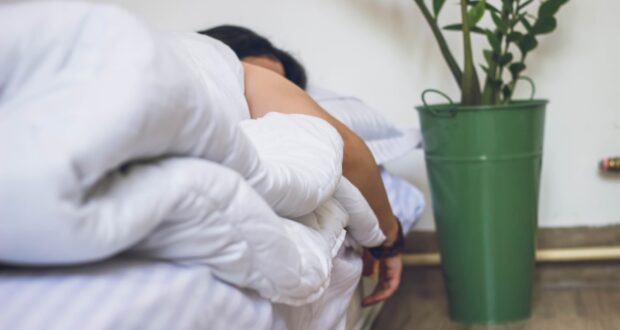By: Guest Author
Published: February 21, 2023
Written by Sarah Kaminski- Guest Contributor
The quality of your sleep impacts every aspect of your life. It’s reflected in how you feel in the morning, how grumpy you are in the evening, and every element of your health in between.
When you enter menopause, you go through all kinds of changes, and your sleep begins to suffer as a consequence. Let’s talk about the connection between sleep and menopause and how you can start to sleep better.
Hot Flashes and Sleep
Hot flashes are often the reason your sleep gets disrupted in menopause. The extreme heat you feel can wake you up in a pool of sweat in the middle of the night, and you often won’t be able to fall right back asleep.
There is also a theory that changes in the brain that cause hot flashes also cause sleeplessness, as women in menopause often report they have trouble falling and staying asleep when they are not experiencing a hot flash.
Insomnia and Menopause
Insomnia is another side effect of menopause. Menopause can make you feel tired during the day but wakeful at night. It can also impair your focus and make you significantly more irritable.
Insomnia is also very common, as 61% of postmenopausal women reported symptoms of it. Typically, the longer it lasts, the worse you feel overall. Chronic insomnia can impact your immune system and the overall functioning of your body and mind.
Sleep Apnea and Menopause
Women can also develop sleep apnea in menopause, as they begin to produce less estrogen and progesterone. Unfortunately, this condition often goes undiagnosed, as most women will connect their sleep disorder to menopause itself, without thinking to look for another cause.
Sleep apnea symptoms in menopausal women are also less severe than in men, so most clinicians fail to spot them even if a woman does mention them.
Other Sleeping Issues
Women in menopause are also more likely to have restless leg syndrome, suffer from nightmares, and overall have a lower quality of sleep than premenopausal women.
Your partner may also impact the quality of your sleep. If they are restless throughout the night, your lighter sleep may be disrupted where once you were able to sleep through anything. Reconsider your sleeping arrangements and consider wearing earplugs to shut out any intrusive sounds you can no longer ignore in the night.
How to Sleep Better in Menopause
If you have already hit menopause (or are about to), you don’t need to panic. You can still get a good night’s sleep, but you will need to change your lifestyle somewhat.
Here’s what you can do:
Exercise Daily
Exercise at any stage of life helps prevent insomnia. The rule still applies for menopausal women, so just by upping your daily exercise level, you can start to sleep better.
You can begin by taking more steps each day. 8000 is what you will need to maintain your current figure, while you will need 11.000 if you also want to slim down. This may seem like a lot, but it can be done in roughly an hour and a half, depending on your pace.
You can also do yoga, Pilates, or take up a group class: anything that will get your body moving is most welcome.
Improve Your Mattress
You should also look into buying a better mattress. If you are currently sleeping on one that is not quite right for your sleep needs, menopause might have nothing to do with your fatigue.
Look into mattresses that aren’t made with fiberglass and provide enough support, but still be soft enough to promote better sleep.
You should also take stock of your bedding and get something that will allow your body to breathe in the night. If you also really like the material and pattern, you will look forward to diving into it every evening.
Reconsider Technology
Technology can do a lot to impact our sleep, both in a good and a bad way. If you stare at screens a lot, especially before bed, your body will need time to start producing melatonin, the hormone that puts you to sleep.
Limit your use of tech an hour before sleep. Read a book instead, and you’ll notice you are less restless when you go to bed.
However, technology can also be used to put you to sleep and help you sleep better. Listening to sleep stories, soothing sounds, or an ASMR video might help you fall asleep more easily. A smart clock can wake you up with light and gentle sounds. Wearing a smartwatch or a smart ring can help you learn more about your sleep cycles and pinpoint the cause of your sleeplessness.
Wrapping Up
Menopause can significantly disrupt your sleep and leave you feeling drained and irritable. However, you can still get a good night’s sleep if you change some of your habits. Start by making better sleep a priority.
Author Bio: Sarah is a life enjoyer, positivity seeker, and a curiosity enthusiast. She is passionate about an eco-friendly lifestyle and adores her cats. She is an avid reader who loves to travel when time allows.
The views expressed herein this article, written by a guest contributor, do not necessarily represent those of the Red Hot Mamas organization. The content is for informational purposes and should not substitute the advice of your doctor.
 Red Hot Mamas In Charge of Change.
Red Hot Mamas In Charge of Change.




